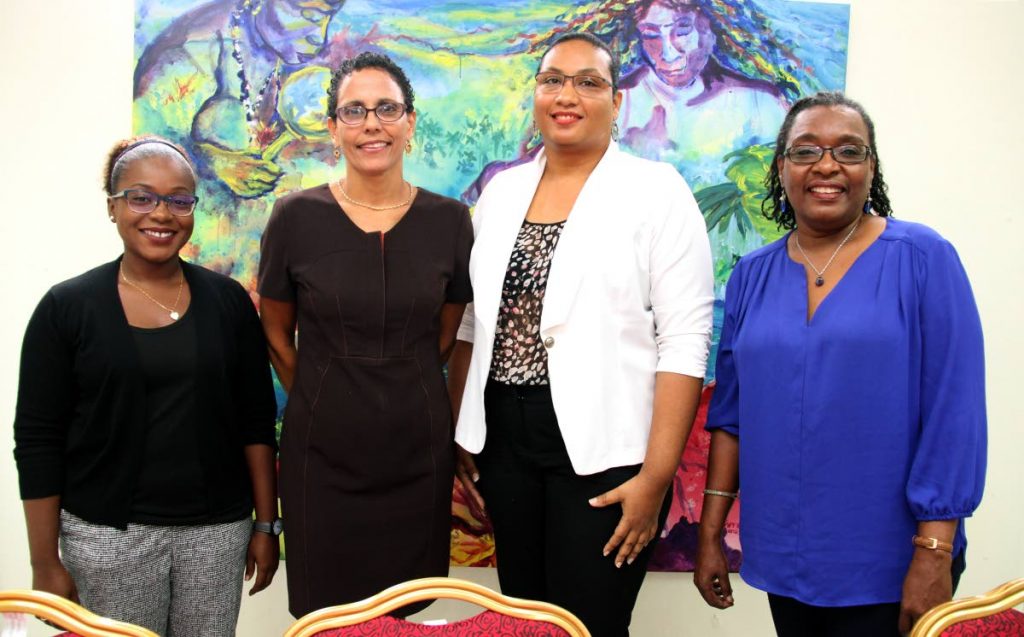Domestic violence at crisis level in TT, region

STATING that domestic violence and violence is now at crisis and epidemic levels both in TT and the Caribbean, the Coalition Against Domestic Violence on March 16 called for several changes to be made to address the issue.
Both Professor Rhoda Reddock and Gregory Sloane-Seale, speaking in a personal capacity, said that domestic violence in TT and the Caribbean was at crisis levels and epidemic proportion, respectively.
Changes to how police responds to domestic violence were among the suggestions offered at last Friday’s press conference at its Robinsonville, Belmont Circular Road, Belmont office. Roberta Clarke, the coalition’s president, called for an investigation of the police’s response to the report made by Abigail Chapman. Clarke said the murders of Chapman, Olivia Chapman, Michael Scott and Mickela Mason were preventable since it appeared Chapman has made a report to La Brea police station of acts of violence and threats and called for justice for the families. Three police officers from the La Brea Police station have since been suspended following an investigation into how they responded to a report made by Chapman.
She said an investigation should also be looked into “the actions of police in relation to reports which may have been made by all persons who were killed, seriously injured or died as a result of domestic violence over the last four months. These include Samantha Isaacs, Arisa David, K’la Solomon-Cain, Sumatee Persad, Rachel Madoo and Margaret Ragoobar-Guevarra.”
The four-member panel speaking on the matter consisted of Clarke, Leah Thompson the project coordinator of the University of the West Indies’ (UWI) Institute of Gender and Development Studies, Reddock who was representing the Caribbean Association for Feminist Research and Action and Simone Reid representing The WomenSpeak Project. Womantra’s Stephanie Leitch, Sloane-Seale and Anthony Inglefield, chair of the executive committee for The Shelter for Battered Women and Children, were among some of those gathered.
Clarke said police have “amongst the most challenging jobs and that the consequences of social and economic problems end up in the criminal justice system. We recognise that ending gender-based violence, indeed all violence, requires an integrated national response that focuses on prevention, on social justice, equality and on building a culture of peace.”
Yet, Clarke said, the centrality of policing to the immediate protection against domestic violence for women and children in particular required the police service do a close review of its procedures and policies to address any shortcomings.
Clarke called for “structured dialogue” between organisations working on gender-based violence and the police service led by the commissioner.
The coalition also called for a review of police powers saying that the time might have come for “law reform which requires mandatory arrests and charging of persons who commit violent crimes against their partners, former partners of persons in the household or family.
“Mandatory arrests and charging should also be accompanied by psycho-educational interventions which allow perpetrators to take personal responsibility for their violence and commit to non-violence.”
Another change Clarke suggested was the review of the Domestic Violence Act to ensure “full implementation.”
It called for the judiciary to provide “up-to-date information” on how many applications result in protection orders, “the duration of time between the date that an application is made and the date that the application is determined and what happens to those who breach protection orders.”
Clarke called for the government to finalise the National Strategic Plan on Gender-based Violence and Sexual Violence within the next six months. She said the organisation understood it has been pending before this Cabinet since 2016. “This strategy must address prevention, protection and punishment. It must be fully funded and with clear accountabilities for implementation,” she said.
Reddock said, “Gender-based violence, violence against women, child sexual abuse and violence in general in TT has now reached crisis proportions. Here and in the wider Caribbean.
“We feel that our state agencies need to begin to think deeply about the factors contributing to this crisis and to go beyond what has been done before. We feel that in the comprehensive strategy on gender-based violence issues of prevention and strategies for long-term change in the gender cultures and ideologies that shape masculine behaviours needs to get serious attention.”
She said there was a need to strengthen the country’s social services. “We believe the ever expanding national security expenditure could only be reduced with increased attention to the social sector.”
Sloane-Seale said as a male in the society, it was something “we” (males) have to take responsibility for. “I think males have to come out and show solidarity with our females in this push for their safety and security but for all our safety and security,” he said.
“It is something that is being addressed on a certain level but given the epidemic proportion that we are experiencing in TT...as Roberta rightly said most of what is going on is unreported... I interact with people every day and I can tell you family violence, gender-based violence is at an epidemic proportion in TT and is driving a lot of the social dysfunction that we are seeing...,” Sloane-Seale said.


Comments
"Domestic violence at crisis level in TT, region"